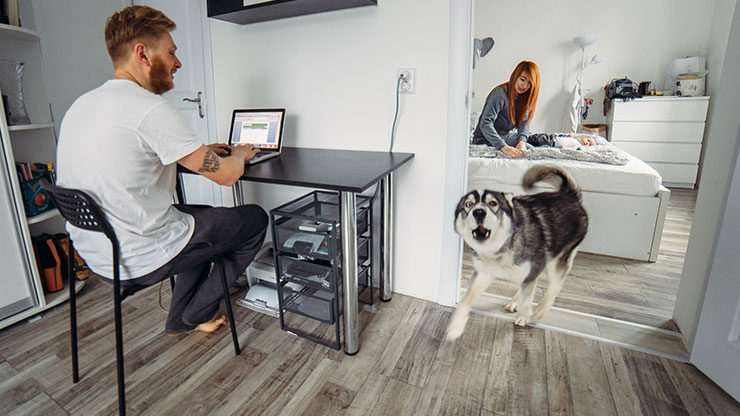
Quick Fix for Barking
It's normal, natural, and, to a dog, it's necessary. However, to people, it can be a real nuisance. Dogs don’t always understand the difference between when their barking is needed and when it’s too much. So how can an owner communicate back to their dog when the barking needs to stop? In this article, we look at the barking from the dog's point of view while offering some easy and practical tips to help fix barking issues!
Acceptance - Your Dog Will Bark
If you have a dog, regardless of age, breed, or size, at some point, they will bark. Their barks indicate that they have noticed something and, in response, are sounding an alarm of sorts to alert us, their humans. This act of barking has long been bred into dogs by mankind just for that reason. Fortunately, people today don’t have the same threats as they did back in prehistoric days; however, without said primitive threats, it leaves anything and everything as a possible trigger for barking in modern dogs. This means that a dog’s barking nowadays can come across as disruptive or annoying instead of being appreciated. Owners want to know when a stranger is nearby or something isn’t right, not necessarily that the neighbor's cat is walking by or that a leaf or stick startled the dog (causing it to bark in response). A barking dog may not be as big of an issue for some, but since the pandemic, more people are working from home. So barking now causes more problems within the household and for neighbors of nuisance barkers as well.
According to recent studies done by the Pew Research Center and summed up in an article titled COVID-19 Pandemic Continues To Reshape Work in America, it states that, “Looking to the future, 60% of workers with jobs that can be done from home say when the coronavirus outbreak is over, if they have the choice, they’d like to work from home all or most of the time. This is up from 54% who said the same in 2020.” So, with more than half of employed people shifting toward working from home as the norm, disruption and annoyance, such as barking, only intensify anger or frustration. In contrast, before covid, most people would not be home to hear the incessant barking.

Take A Step Back
What can be done in response to a dog’s insistent barking, then? Many owners turn to physical punishment or loud vocal commands in the hopes that they can get through to their dogs. Yet, for dogs, things like yelling or physical acts against them are not the right ways to attempt to communicate or fix the issue. The problem with the gut-reaction type of response to a dog's problem behavior is that it doesn't always work. It can make matters worse, thus creating more problems than it resolves. With dogs - and people, too - a person can gain more ground with calmer, positive approaches. This form of acting instead of reacting can be hard to adjust to, but it will make a world of difference when attempting to work with a dog. Owners must remember that with dogs, it takes consistent training and patience to get them on the right track.

What To Do?
The first step is to locate the trigger of the barking. Is there a certain object that triggers your dog or a certain situation that changes their usual behavior? Take notes and see if there are patterns. Owners who find triggers can focus on them and work to get their dogs to stop. In Dr. Rosemary Elliot's article Why Is My Dog Barking, she says that “Once you’ve identified the trigger, it’s time to do some simple obedience training to retrain your dog’s brain to not associate the trigger with a need to bark. Behavioral modification training involves using rewards-based, or positive reinforcement, to teach your dog what ‘good’ behavior is.” While this method might sound technical and scientific, it's quite simple. Introducing your dog to the trigger a little at a time at a rate where they aren't reacting by barking allows you time to reward the not-barking behavior. You are simply creating opportunities to train the behavior you want to see instead of the undesired behavior - barking at the trigger. As with all good things, it will take a little time, but with consistent work of exposing your dog to the trigger in small steps (maybe from far away at a distance where they aren't triggered), your pup will begin to catch on quickly. This will give you ample opportunities to reward the good behavior instead of the bad.
Now, if a dog will bark at just about anything and not a specific trigger, a different method could be called for to help the situation. In Stanley Coren’s article A Quick Fix for a Barking Dog, he goes back to the roots of dogs and their wild wolf ancestors. With wild adult wolves, barking is not common, but it is found in the pups as they learn new behaviors. Persistent barking can give away a den location, risk the pup's life, or cause a false alarm if done frivolously. So how do mother wolves discourage pups from indiscriminately barking when trying out their newly learned behaviors? Wild wolves do not have a wide range of training devices at their disposal, like no-bark collars, nor do they raise their voices to try to stamp the behavior out. Instead, when young pups bark, the mother patiently and gently places her mouth on the pup's muzzle and lets out a low growl. This behavior eliminates the barking almost immediately. Coren indicates that a modern dog's owner can also imitate this method. When a dog is in the throes of a barking frenzy, an owner can gently place a hand on their dog's muzzle and, in a low tone of voice, give the command, "Quiet." This isn't meant to be a physical punishment or harsh correction. It simply uses the sense of touch to break the dog out of its barking fit. Once the dog has quieted, they can be rewarded. Doing this will still require time and patience for a dog to get the message, but the results will be far better than matching their loud, anxious, or excited energy.
Another easy approach owners of boastful barkers can use to train them is teaching them the command “Quiet.” To do this, when your pup is well-behaved and quiet, calmly say “Quiet” and give them a favorite treat! Your dog will not understand at first, but if you do this as often as you can throughout the day for several weeks, they will begin to associate their calm, well-behaved, quiet behavior with the treat and the word “Quiet.” After repeating this for a few weeks, you can try it out when they begin their barking frenzy. As they are barking, get your dog’s attention by calling them to you or saying their name - basically to get their mind off the trigger. Then say the word “Quiet” calmly and wait for them to register what that word means. Give them a treat and play a favorite game as soon as they are quiet.
Remember, the key to success is three-fold: Managing the trigger, removing your dog from access to the trigger, and rewarding a more desired behavior instead of the unwanted barking behavior. Otherwise, if left unchecked, the barking behavior will continue and sometimes even increase in frequency, intensity, and duration.

Conclusion
Dogs bark for many reasons. Getting them to understand that their owner doesn't need to be alerted every second for every little thing could make a big difference in your household and in your relationship with your dog. Positive, reward-based training will help when it feels like you’ve tried everything else. It will take time and patience, but your bond with your dog will be stronger than ever. If you live with an intense barker, learning to communicate with your dog in a way that they will understand instead of attempting how people communicate or using harsh methods can be a game changer. And if training doesn’t work and your dog is simply overanxious and reactive, there may be other factors at work, and a trip to the veterinarian could be required.
Works Cited:
Coren, S. (2020, August 20). A Quick Fix for a Barking Dog. Psychology Today. Retrieved from https://www.psychologytoday.com/us/blog/canine-corner/202008/quick-fix-barking-dog
Elliot, R. (2019, February 28). Why Is My Dog Barking? RSPCA Pet Insurance. Retrieved from https://www.rspcapetinsurance.org.au/pet-care/dog-care/why-is-my-dog barking#:~:text=Dogs%20may%20bark%20when%20calling,a%20ring%20of%20the%20doorbell.
Parker, K., Horowitz, J. M., & Minkin, R. (2022, February 16). COVID-19 Pandemic Continues To Reshape Work in America. Pew Research Center. Retrieved from https://www.pewresearch.org/social-trends/2022/02/16/covid-19-pandemic-continues-to-reshape-work-in-america/










